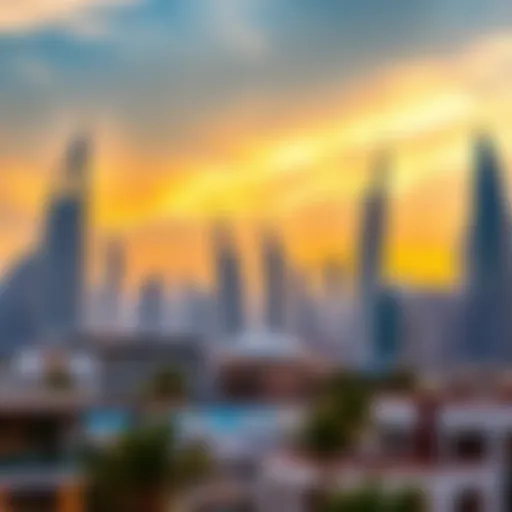Understanding the Importance of the Fifty-Second UAE National Day
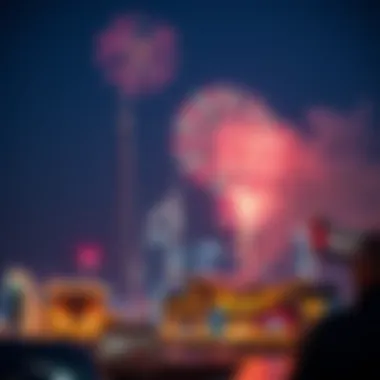

Intro
The fifty-second UAE National Day is a celebration that goes beyond mere festivities; it embodies the spirit and unity of a nation that has dramatically transformed in a relatively short period. Although it is observed annually on December 2nd, the significance of this day reverberates year-round in the hearts and minds of Emiratis. With roots dating back to 1971, this occasion not only commemorates the union of seven emirates into a single federation but also serves as a moment for reflection on the milestones achieved since then.
In recent years, the UAE has emerged as a global hub for tourism, trade, and innovation. The National Day celebrations include a blend of traditional sounds and modern spectacles, capturing the essence of a society that respects its rich heritage while boldly pushing towards a future teeming with potential. From firework displays lighting up the skyline of Dubai to cultural exhibitions showcasing the country’s history, the events of this day are a vivid tapestry of national pride.
This year, the festivities are expected to resonate even more profoundly as the UAE continues to navigate both local and global challenges. Understanding the significance of the fifty-second National Day is essential for anyone interested in the UAE’s ongoing narrative—be it investors, citizens, or expatriates.
An exploration of this national celebration offers insights not just into the historical context and key milestones of the UAE, but also highlights evolving cultural practices that contribute to national identity. The power of this day lies not just in the celebrations themselves but in the unity and aspirations they represent.
Historical Context of the UAE National Day
Understanding the historical context of the UAE National Day reveals the roots and developments of a nation that has grown vastly in a short time. This backdrop holds importance not just for Emiratis but also for investors, homebuyers, realtors, expats, and anyone looking into the UAE as a place for opportunity and growth. The historical narrative enriches the meaning behind the celebrations, thereby providing insights into the emirate's unity and identity.
The Formation of the UAE
The United Arab Emirates, a federation of seven emirates, came into being on December 2, 1971. This day marks a significant milestone— the unification of these territories into a single nation-state. The emirates are Abu Dhabi, Dubai, Sharjah, Ajman, Umm Al-Quwain, Fujairah, and Ras Al Khaimah.
Before this formation, the region was characterized by disparate tribal societies with varied customs and languages. The discovery of oil in the 1950s changed the dynamics, offering wealth that encouraged collaboration among the emirates. Sheikh Zayed bin Sultan Al Nahyan, the first President of the UAE, played a pivotal role in promoting unity. His vision extended beyond collective security to encompass a broader goal of shared prosperity.
"The union is a pact of love and brotherhood, a ties that binds us all together," — Sheikh Zayed.
Key Milestones Leading to Independence
Various milestones paved the way to the formation of the UAE. Each one represents a crucial step towards achieving independence and defining its identity:
- British Treaty System (1892): The British signed treaties with the Trucial States (now the UAE), establishing a protectorate. This relationship lasted until the late 1960s, as the British withdrew their presence from the region.
- Formation of the Trucial States Council (1952): This council aimed to foster cooperation among the emirates and laid the groundwork for future unity.
- Oil Discoveries in the 1960s: The wealth generated from oil laid the foundation for modernization and a shift away from traditional lifestyles.
- Independence from British Rule (1971): On December 2, following the British military extraction, the seven emirates united to form the UAE.
- The Constitution (1971): This document further solidified the structure and governance of the new federation, marking a commitment to a modern state characterized by federalism.
These events underscore the journey from individual tribal territories to a unified nation. The combined emphasis on unity and governance shapes the modern identity of the UAE, reflecting a collective aspiration that grows deeper with each National Day celebration.
In looking at the history of the UAE National Day, one cannot overlook the importance of these key elements; they not only highlight the past but also inform the ongoing narrative of what it means to be part of this resilient federation.
Symbolism of the UAE National Day
The UAE National Day is much more than just a festive occasion; it embodies the very essence of the nation’s identity. The celebrations, traditions, and symbols associated with this day reflect the shared values, aspirations, and history of the Emirati people. Understanding the symbolism behind these elements helps to illuminate the rich tapestry of what it means to be part of this vibrant nation.
National Anthem and Flag
One of the most prominent symbols of the UAE National Day is the national anthem, "Ishy Bilady". This powerful piece of music is not merely a song but a declaration of the nation’s spirit. The lyrics echo the sentiments of pride, loyalty, and sacrifice, encapsulating the emotions that resonate deeply within the hearts of Emiratis. Played with fervor during national ceremonies and celebrations, the anthem stirs a sense of unity among citizens and residents alike, bringing them together under a shared purpose.
The UAE flag, featuring its striking colors of red, green, white, and black, stands as a powerful emblem of the nation’s heritage. Each color carries significant meaning: red signifies bravery, green symbolizes hope, white represents peace, and black denotes strength. As families and communities gather to raise the flag, it serves as a reminder of the resilience and courage that the Emirati people have shown throughout their history.
"The flag is not just a piece of cloth; it's woven with the threads of our heritage, culture, and aspirations."
By showcasing the flag at homes, businesses, and institutions during the National Day celebrations, Emiratis express their pride and commitment to the nation. The display acts as a visual metaphor for unity, reinforcing the idea that everyone has a role to play in the country’s ongoing story.
Cultural Symbols and Their Meanings
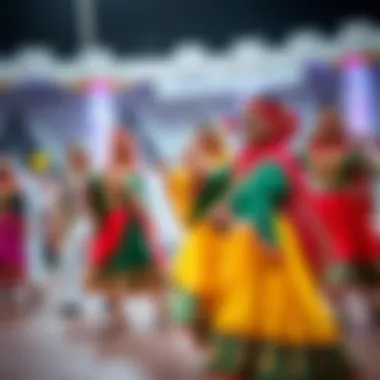
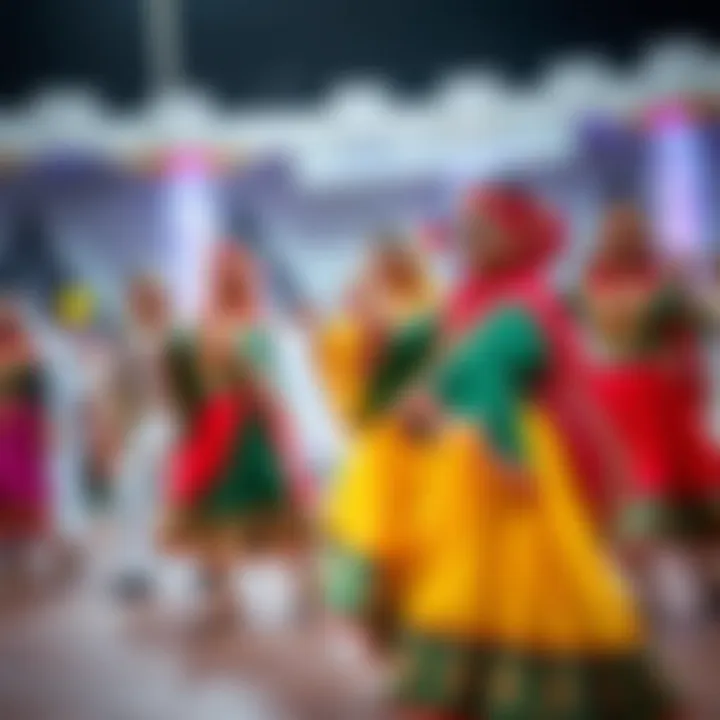
Beyond the anthem and flag, various cultural symbols enrich the significance of the National Day. Traditional dress, like the kandura for men and the abaya for women, enhances the pride in Emirati culture. Worn during the celebrations, these garments connect individuals to their roots and signify a commitment to preserving cultural traditions.
Moreover, traditional crafts, such as weaving, pottery, and calligraphy, come alive during National Day events. Each artifact tells a story of artistic heritage passed down through generations. They are not just decorative but serve as a tangible representation of the skills, ingenuity, and creativity of the Emirati people.
In the culinary realm, dishes like shawarma, lamb kabsa, and date sweets play an integral role in the festivities. These foods, rich in flavor and history, bring families together, symbolizing hospitality and generosity that the UAE is known for. It’s a day when cooking becomes a communal activity, and meals are shared with friends, neighbors, and visitors alike, showcasing the Emirati spirit of togetherness.
Celebrations Across the Emirates
The fifty-second UAE National Day is a time when Emiratis come together to celebrate their rich history and promising future. The celebrations across the Emirates are not just events; they are a manifestation of a collective national identity. This strong sense of unity is crucial for developing a country that continuously evolves while cherishing its traditions. The public gatherings and private festivities help solidify that bond among the people. They reflect a unique tapestry of cultures, pride, and a spirit of resilience.
Public Celebrations and Events
Every year, the UAE witnesses a cascade of public celebrations that dazzle locals and visitors alike. Each emirate offers its unique flavor to the festivities, joining hands to reflect the country’s diverse heritage. Major cities like Dubai and Abu Dhabi turn into vibrant stages of cultural displays, showcasing everything from traditional dances to stunning firework shows.
For instance, Dubai is famous for its extravagant firework displays at iconic locations such as the Burj Khalifa and the Dubai Marina. It's not just about the visuals; these events draw people from all walks of life, creating a kaleidoscope of laughter and excitement. Further, many neighborhoods organize parades, including colorful floats that embody the spirit of the UAE.
- Parades: In various emirates, parades featuring traditional attire and displays of local art make their way through the streets, allowing everyone to witness the essence of Emirati culture.
- Cultural Performances: Dance troupes and musicians take center stage, performing folk dances like the Ayallah and showcasing traditional musical instruments.
- Family Activities: Many public spaces organize family-friendly activities, allowing children to join in on the celebrations with games, stalls, and interactive exhibitions.
These events play a dual role. They not only entertain but also educate young generations about their cultural heritage. For expatriates and tourists, experiencing these vibrant celebrations offers a glimpse into what makes the UAE truly special.
Private Commemorations and Family Gatherings
While the public celebrations steal the spotlight, private gatherings are equally significant. For many Emiratis, National Day serves as a time for family and close friends to come together, fostering bonds that may have weakened in the hustle of daily life. These smaller, more intimate commemorations allow families to reflect on their roots and share stories of the UAE’s past with younger generations.
Families often decorate their homes with UAE flags and symbols showcasing their pride and commitment to their homeland. Delicious feasts are a common thread, where traditional dishes such as machboos and luqaimat are served, bringing everyone to the table for a meal laden with history and flavor.
- Decorations: From light displays to flag-waving, local customs incorporate national象征 at homes, enhancing the spirit of the occasion.
- Storytelling: Elders share tales of the UAE's journey to independence, emphasizing the values of unity and perseverance.
- Community Engagement: Neighbors often visit each other’s homes, fostering community spirit and reinforcing social ties, vital aspects of Emirati culture.
Through these private commemorations, the essence of the UAE National Day transforms into personal narratives, reflecting how the broader national narrative resonates within individual households. The celebrations seamlessly interweave the historical with the contemporary, reinforcing the idea that while times may change, the spirit of the Emirati identity remains steadfast.
"It's not just a day; it's a feeling of pride, a connection between the past and the future, and a celebration of unity among us all."
Cultural Activities Associated with National Day
Cultural activities during the UAE National Day serve as both a celebration and a reminder of the rich heritage that underpins the identity of the nation. They bring together people from all walks of life, allowing for a sense of community and shared values. Integral to this commemoration are traditional music and dance performances, alongside vibrant art exhibitions and cultural fairs, each contributing to the national sentiment while creating an atmosphere of joy and enthusiasm.
Traditional Music and Dance Performances
Traditional music and dance form the backbone of cultural expression in the UAE. On National Day, these performances resonate throughout the emirates, giving life to the festivities. The rhythmic beats of the al-ayaalah, a traditional Emirati dance, can draw crowds, as performers dressed in traditional attire engage in this dynamic show of strength and coordination. This dance, often accompanied by poetic verses, celebrates heritage and the spirit of unity among Emiratis.
The significance of these performances lies in their ability to convey stories and histories of the Emirates through movement and melody. As many audiences lose themselves in the vibrant colors and engaging rhythms, they're reminded of the values their ancestors upheld, as well as the sacrifices made for the country's independence.
Moreover, these gatherings act as a platform to engage younger generations, linking tradition with modernity. By witnessing these performances live, youth participate actively in their culture, fostering an appreciation that transcends mere entertainment.
Art Exhibitions and Cultural Fairs
Art exhibitions and cultural fairs during the National Day festivities spotlight local talents and promote the thriving arts scene in the UAE. Various galleries and outdoor spaces are transformed into vibrant hubs where artists can display their works, offering an array of creative expressions, from contemporary pieces to traditional art forms. Through these exhibitions, the spirit of the UAE shines brightly, illustrating the diversity and the ingenuity of its people.
Local and invited artists alike take this opportunity to showcase works that symbolize national pride and identity. Attendees often find themselves immersed in intricate crafts that reflect the UAE's rich culture, from handcrafted pottery to elegantly woven textiles. Not only does this foster community, but it also provides artists with invaluable exposure, allowing them to connect with potential buyers and art lovers.
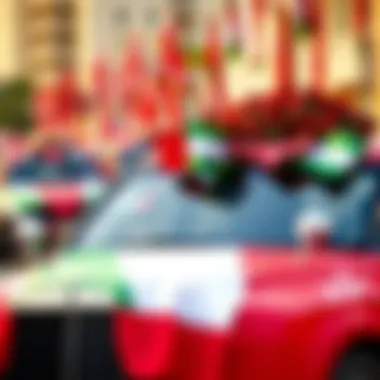
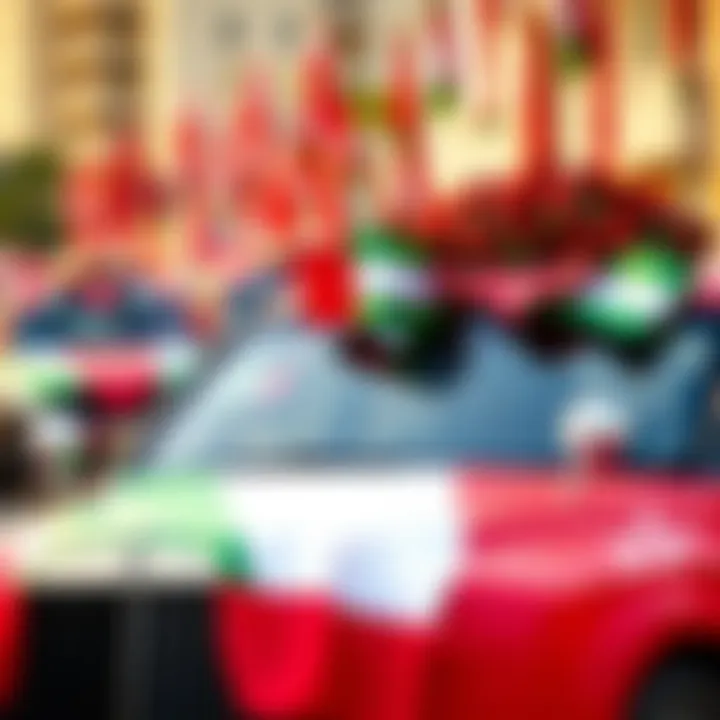
Cultural fairs during National Day also incorporate workshops, food stalls, and interactive installations, offering a multi-sensory experience that brings families together. Local cuisine, music, and art coalesce in events that allow visitors to fully immerse themselves in Emirati culture. This dynamic environment cultivates a deeper understanding of the values, traditions, and narratives that form the heartbeat of the nation.
"Cultural activities exemplify the spirit of the UAE, connecting past and future generations in unity and pride."
The Role of Youth in National Day Celebrations
The youth of the United Arab Emirates hold a significant role in the fabric of National Day celebrations. Their enthusiasm and fresh perspectives contribute immensely to the way this event is perceived, celebrated, and evolves each year. Engaging younger generations is not merely about participation; it corresponds to a deeper connection with the nation's identity and values, inevitably influencing how future generations will celebrate and honor their heritage.
Engaging the Younger Generation
Connecting with the younger crowd is vital for ensuring that the National Day remains relevant. Schools and community organizations often initiate springboards for involvement. Programs that incorporate art, music, and sports not only attract youth but also instill pride in their national identity. These initiatives transform celebrations into platforms for expression, allowing young people to convey their interpretations of Emirati culture. Celebration themes often reflect modern interpretations of traditional customs, making them more relatable and engaging.
For instance, many schools hold competitions, such as art exhibitions or poetry readings, centered around the nation's achievements. Events organized on social media platforms, like Instagram or TikTok, create buzz and excitement that reach beyond traditional means of communication, drawing in even those who might be ambivalent about direct participation. The energy levels can turn up significantly with the right hashtags and viral trends energizing a collective spirit.
Youth-led Initiatives and Events
Youth organizations routinely spearhead projects that both commemorate and innovate National Day celebrations. For example, initiatives such as community volunteer days are organized, allowing young Emiratis to engage in activities like park cleanups or charity drives. Events like these do more than commemorate their national identity; they develop responsible citizens who believe in giving back to their communities.
There’s also a noticeable surge in cultural performances that are not just focused on traditional music and dances. Young talents perform remix versions of national songs or create twists on folk dances, breathing new life into age-old traditions. These performances occur at community festivals and even within organized public events, showcasing the nurturing of creativity alongside tradition.
Youth involvement can also enhance the experience through outreach programs that educate expatriates and tourists about the significance of National Day. This creates an environment where cultural sharing and understanding flourish, allowing the youth to become ambassadors of their culture.
“The future of our nation lies in the hands of our youth; their creativity and engagement breathe life into our rich traditions.”
In summary, the input and participation of the younger generation in UAE National Day celebrations serve multiple purposes. It fosters unity, enhances national pride, and develops a sense of responsibility among Emiratis. As the 52nd National Day approaches, the excitement generated by youth-led initiatives will pave the way for a vibrant celebration, ensuring the legacy of the UAE continues for many generations to come.
National Day's Impact on National Identity
The UAE National Day stands as a cornerstone in shaping the collective national identity of Emiratis. Celebrated annually, it not only marks the historical formation of the federation but also encapsulates the values, culture, and aspirations of a diverse population. As the nation observes its united efforts and achievements, the National Day serves as a mirror reflecting the unique identity forged through shared experiences and collective memory.
Fostering Unity Among Emiratis
Unity is the heart of any nation, and in the context of the UAE, the National Day plays a crucial role in fostering such solidarity. Each year, from Ras Al Khaimah to Abu Dhabi, millions of Emiratis come together, transcending differences in region, age, and background.
On this day, civilians, families, and leaders gather to celebrate common values that bind them. For instance, the camel races and the falconry competitions serve as cultural touchstones that not only entertain but also reinforce traditional ties. These events showcase Emirati skills and heritage, allowing younger generations to learn and appreciate their roots.
Moreover, the parades featuring cultural performances highlight a sense of pride and joy throughout the country, helping to bridge gaps that may exist among various Emirati communities. This harmonizing effect is evident as people share their stories, laugh together, and cherish the moments that define their identity as Emiratis.
"National Day is not just a celebration; it’s a reflection of our journey together as one nation, building bridges between our past and future."
Strengthening the Ties to Heritage
Heritage and identity are inseparable. The UAE National Day serves as a reminder of the rich cultural tapestry that characterizes the nation. It reminds everyone, both local residents and expatriates, of the traditions that have shaped the UAE over centuries.
Emiratis take pride in their heritage, and throughout the celebrations, elements such as traditional music and clothing become prominent. The appearance of folk dances, like Al Ayalah, and the nostalgic sounds of the Oud generate an emotional resonance, linking the present to the past. These cultural expressions aren’t just performances; they encapsulate a profound historical significance that underscores the collective memory of the Emirati people.
Through exhibitions and arts fairs, stories of resilience, trade, and innovation come to life, offering insight into how past generations faced challenges and built a thriving nation. The National Day celebrations invite a deeper understanding among community members about their shared heritage, consequently increasing their connection to the nation.
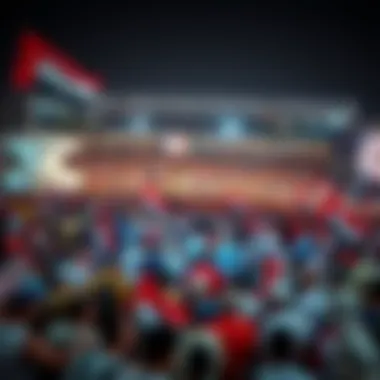
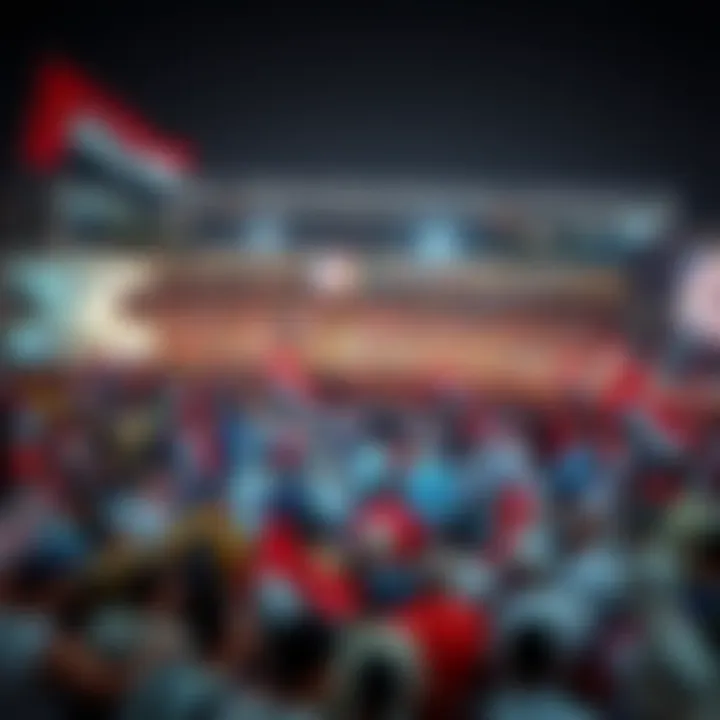
Influence on Global Perceptions of the UAE
The perception of the United Arab Emirates on the global stage has been shaped through a tapestry of cultural, historical, and celebratory threads that intertwine the nation’s essence with international views. The fifty-second UAE National Day stands as a significant milestone that not only celebrates national unity but also serves as a launchpad for how the country is viewed abroad. This day highlights the Emirati spirit, showcasing the progress and achievements that make the UAE a remarkable hub for business, tourism, and culture.
One of the key dynamics of the UAE National Day is its ability to foster international relations and strengthen diplomatic ties. Every year, various countries participate in celebrations through exhibitions, cultural exchanges, and festivities, illustrating a mutual respect for Emirati culture. These international celebrations hold immense value in presenting the country not just as a destination for economic investments but as a melting pot of diverse cultures that welcomes global citizens.
International Celebrations and Participation
The UAE's National Day is a communal event that extends beyond its borders. Countries worldwide engage in activities that mark this occasion, creating a global celebration. For instance, nations like the United States, the United Kingdom, and beyond often host events that acknowledge UAE National Day, featuring Emirati cuisine, traditional music, and art exhibits. Through these global celebrations, the UAE's national identity gets reinforced, drawing attention to its rich heritage and modern advancements.
Moreover, the participation of international dignitaries in such events emphasizes the UAE's standing in global geopolitics. When world leaders attend or partake in these celebrations, they signal their recognition of the UAE as an important player in various sectors, such as commerce and culture.
Media Portrayal and Reputation Building
The role of media in shaping perceptions cannot be overstated. Coverage of the UAE National Day helps in sculpting the country’s image across different platforms. Social media is brimming with celebratory posts, insights into traditional practices, and showcases of the beautiful landscapes of the UAE. On channels like Facebook, Instagram, and Twitter, both locals and expatriates share moments that reflect the vibrancy of the culture, creating a cascading effect of positive sentiments about the UAE.
A significant media portrayal comes from documentaries and news specials that highlight the UAE’s journey over the years. Such features often dive deep into the development achievements, innovations in infrastructure, and the robust economy, further enhancing the country's reputation as a progressive nation.
Through both mainstream and social media avenues, the narrative around the UAE transforms from just acknowledging its accomplishments to inviting investors, tourists, and expatriates to witness its journey firsthand. The careful curation of media content around the UAE National Day contributes to an enhanced global understanding, making prospects for collaboration and engagement all the more inviting.
Future Aspirations of the UAE National Day
The future aspirations of the UAE National Day are crucial not just for the commemorative significance of this occasion but also for its role in shaping the nation’s identity and ambitions. As the UAE celebrates its fifty-second National Day, it stands at a crossroads, balancing rich traditions with modern aspirations. This blend provides a unique opportunity for both citizens and residents to reflect on past achievements while envisioning a prosperous future.
Anticipating the National Day of the Future
As the UAE moves forward, National Day celebrations are likely to evolve significantly. Traditional festivities, marked by firework displays and public gatherings, may increasingly incorporate technological advancements. Think along the lines of live-streaming events that allow expatriates around the globe to partake in the celebrations. Moreover, future celebrations might focus more on sustainability, aligning with global efforts to combat climate change.
- Embracing urban green projects throughout the emirates can serve as a backdrop for the celebrations.
- Innovations in performance art, such as augmented reality displays, could reimagine cultural performances, making them more engaging and interactive for all ages.
The future might also bring about a greater emphasis on commemorating contributions from various sectors—whether through exhibitions that showcase the arts, technology, or sustainable practices. This transformation in focus can help unite communities in a celebration that honors diversity while fostering a sense of belonging.
Vision for the Next Decade
Looking ahead to the next decade, the vision for UAE National Day can serve as a reflection of the Emirati people's aspirations for growth, unity, and global leadership. This vision could encompass several key elements:
- Cultural Enrichment: Continued investment in cultural institutions, encouraging artistic expressions that resonate with younger generations, while maintaining ties to the past.
- Inclusivity and Participation: Expanding community events to ensure all demographics are represented, including targeted initiatives to involve the youth, women, and expatriates in the celebrations.
- International Collaboration: Strengthening partnerships with countries around the world through joint celebrations, highlighting the UAE's role as a global hub. This could include cultural exchanges or partnerships in various fields, such as technology and sustainability.
- Sustainability Initiatives: Addressing global and local environmental concerns through dedicated awareness campaigns during National Day, reinforcing the UAE's commitment to a sustainable future.
“Embracing the future, while honoring the past, defines the spirit of the UAE National Day.”
Closure
The significance of the UAE National Day extends beyond just a festive occasion; it serves as a powerful emblem of national unity and identity. The observance of this day offers valuable reflection on the historical journey of the UAE—from its humble beginnings to its emergence as a significant player on the global stage. This reflection encourages a deeper understanding of the collective aspirations of the nation's people and the values that bind them together.
Reflection on National Unity and Identity
As Emiratis gather on the fiftieth day of the year, the emphasis on unity echoes loudly among people of different backgrounds and generations. The stories shared during celebrations remind everyone of the sacrifice and determination it took to create a united nation from disparate tribes and cultures. Local customs, such as traditional meals and poetry recitals, play a vital role in weaving individual identities into the fabric of a shared national narrative.
Moreover, the actions on National Day are not limited to merely commemorating history; they are woven into the living culture which undergoes evolution every year. The new initiatives embraced by youth in participating and leading celebrations reflect a modern interpretation of loyalty and pride in the UAE. Their unique contributions shape an engaged citizenry that honors the past while enthusiastically looking forward, forging a robust identity rich in heritage yet adaptable to change.
The Lasting Legacy of the National Day
The legacy of the UAE National Day is multifaceted, leaving imprints in various spheres of life. For investors and homebuyers, it signifies the stability and growth of a region that embraces tradition while pushing the boundaries of innovation. Real estate developments, inspired by the spirit of this day, often showcase themes of unity and progress through architecture that tells the story of the land and its people.
For the expat community, National Day fosters an inclusive environment, where diverse backgrounds come together to celebrate this unique identity. Engaging in the various festivities culminates in an understanding and appreciation for Emirati culture, promoting an ethos of coexistence and collaboration.











